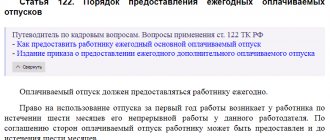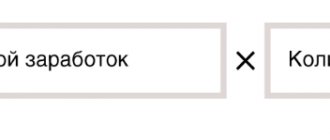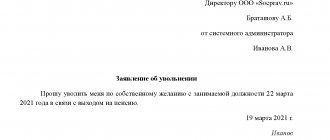Labor legislation guarantees employees paid leave (annual and additional). However, an employee has the right to count not only on paid leave: the Labor Code of the Russian Federation provides for the possibility of providing leave without pay. Only one article of the code is devoted to this type of vacation. Accordingly, employers have many questions related to its use. In what cases does an employer have no right to refuse to provide unpaid leave? How to register it? What is the maximum duration of unpaid leave? You will find answers to these and some other questions by reading the article.
When is unpaid leave granted?
According to Art. 128 of the Labor Code of the Russian Federation, leave of this type can be granted:
- At the discretion of the employer (but after considering the reason why the employee requests unpaid leave and his production capabilities, he may decide to refuse to provide such leave).
- By force of law (when an employer cannot refuse to provide an employee with leave without pay).
Therefore, before making a decision to refuse to grant leave to an employee, you need to not only take into account production issues, but also check whether he belongs to the category of employees who cannot be denied leave.
Let's say a few words about unpaid leave by decision of the employer. Part 1 of Art. 128 of the Labor Code of the Russian Federation establishes that for family reasons and other valid reasons, an employee, upon his written application, may be granted leave without pay, the duration of which is determined by agreement between the employee and the employer. From this rule we can conclude that the mandatory conditions for granting such leave are appropriate circumstances, a written statement from the employee and the consent of the employer.
Let us note that the employer, when deciding to grant leave, at his own discretion evaluates the reasons why the employee requires leave, and if he considers them insignificant or disrespectful, he has the right to refuse. We recommend that you approach this issue objectively, since in the event of a dispute, the court or regulatory authority may side with the employee. For example, the Perm Regional Court considered a case on declaring an order to apply disciplinary measures illegal. B. applied to her employer for unpaid leave for a day, without indicating the reason why it was required. Accordingly, the employer refused to provide leave, but B. did not return to work. For this she was reprimanded. The court, having examined the case materials, found out the reason for the absence - the need to appear at the prosecutor's office and the court (the summons was documented with the relevant documents) - and declared the order to apply a disciplinary sanction illegal (Appeal ruling of the Perm Regional Court dated August 12, 2013 in case No. 33-7452).
Of course, the court does not always side with the employee. If he does not show up for work after the employer refuses to provide unpaid leave, the court may recognize the application of disciplinary measures up to and including dismissal for absenteeism as legal and justified (see, for example, Determination of the Moscow City Court dated September 8, 2015 No. 4g/8 ‑8669/2015, Appeal ruling of the Omsk Regional Court dated 09/02/2015 in case No. 33‑6239/2015).
First well-deserved rest
Employees who have changed jobs often ask HR officers when they can take vacation for the first time. The first time you can write an application in accordance with Art. 122 of the Labor Code of the Russian Federation, provided that the citizen has been working at one enterprise for more than six months. Thus, there is a rule: you must work at a new enterprise for at least six months before you can expect to rest at the employer’s expense. But there are exceptions to it: some categories of workers have the opportunity to rest before the expiration of this period, in particular citizens under 18 years of age.
When will an employer's refusal be unlawful?
As we found out, in some cases the employer is obliged to satisfy the employee’s request for leave without pay. In particular, according to Part 2 of Art. 128 of the Labor Code of the Russian Federation, the employer must provide the following leave:
- participants of the Great Patriotic War - up to 35 calendar days per year;
- for working old-age pensioners (by age) – up to 14 calendar days per year;
- parents and wives (husbands) of military personnel, employees of internal affairs bodies, the federal fire service, authorities for control of the circulation of narcotic drugs and psychotropic substances, customs authorities, employees of institutions and bodies of the penitentiary system, killed or died as a result of injury, concussion or injury, received while performing the duties of military service (service), or as a result of an illness associated with military service (service) - up to 14 calendar days a year;
- for working disabled people – up to 60 calendar days per year;
- employees in cases of the birth of a child, marriage registration, death of close relatives - up to 5 calendar days.
There are often problems with leave on the latter basis.
In particular, the employer does not always correctly identify close relatives. (For example, is it necessary to provide an employee with unpaid leave in connection with the funeral of his uncle?) There is no precise interpretation of this concept in any Russian law. So, according to Art. 2 of the RF IC, family members are spouses, parents and children, and by virtue of Art. 14 of the RF IC, close relatives are considered to be parents and children, grandparents, grandchildren, full and half brothers and sisters. As you can see, the categories “family members” and “close relatives” overlap. We believe that the provision of unpaid leave in connection with, for example, the death of an uncle remains at the discretion of the employer, but a refusal to provide such leave in connection with the death of a grandmother will be illegal. Given in Art. 128 of the Labor Code of the Russian Federation, the list of grounds when an employer does not have the right to refuse leave is far from exhaustive: relevant cases can be established by the Labor Code of the Russian Federation or other federal laws.
For example, according to Art. 173 of the Labor Code of the Russian Federation, the employer is obliged to provide leave without pay to employees admitted to entrance examinations upon admission to a higher educational institution, as well as to students of preparatory departments of educational organizations of higher education for passing the final certification - 15 calendar days. Slightly less—10 calendar days of unpaid leave—is required to be provided by the employer to employees who combine work with obtaining secondary vocational education (Article 174 of the Labor Code of the Russian Federation).
note
An employee with two or more children under the age of 14, an employee with a disabled child under the age of 18, a single mother raising a child under the age of 14, a father raising a child under the age of 14 without a mother, a collective agreement annual additional leaves without pay can be established at a time convenient for them, lasting up to 14 calendar days (Article 263 of the Labor Code of the Russian Federation).
In some cases, unpaid leave is granted to part-time workers. So, by virtue of Art. 286 of the Labor Code of the Russian Federation, if at a part-time job the duration of annual paid leave is less than at the main place of work, then the employer, at the request of the employee, must provide him with leave of the corresponding duration without pay.
But not only the Labor Code defines cases when an employer cannot refuse unpaid leave: such cases can also be established by other federal laws. For clarity, we present them in a table.
| Rule of law | Categories of workers | Duration |
| Federal Law of July 27, 2004 No. 79-FZ “On the State Civil Service of the Russian Federation” | Civil servants | Up to a year |
| Federal Law of March 2, 2007 No. 25-FZ “On Municipal Service in the Russian Federation” | Municipal employees | Up to a year |
| Federal Law of May 27, 1998 No. 76-FZ “On the status of military personnel” | Military spouses | Part of the spouses' leave exceeding the duration of the annual leave at the main place |
| Federal Law of 01/09/1997 No. 5-FZ “On the provision of social guarantees to Heroes of Socialist Labor, Heroes of Labor of the Russian Federation and full holders of the Order of Labor Glory” | Heroes of Socialist Labor, Heroes of Labor of the Russian Federation and full holders of the Order of Labor Glory | Up to 3 weeks per year |
| Law of the Russian Federation of January 15, 1993 No. 4301‑1 “On the status of Heroes of the Soviet Union, Heroes of the Russian Federation and full holders of the Order of Glory” | Heroes of the USSR, Russian Federation and full holders of the Order of Glory | Up to 3 weeks per year |
| Federal Law of January 12, 1995 No. 5-FZ “On Veterans” | Invalids of war | Up to 60 days a year |
| WWII participants | Up to 35 days a year | |
| Combat veterans | ||
| Worked during the Second World War at air defense facilities, construction of defensive structures, naval bases, airfields and other military facilities | ||
| Federal Law of June 12, 2002 No. 67-FZ “On the Basic Guarantees of Electoral Rights and the Right to Participate in a Referendum of Citizens of the Russian Federation” | Proxies of candidates participating in elections, as well as proxies of electoral associations | For the period of office |
| Federal Law No. 20-FZ dated February 22, 2014 “On elections of deputies of the State Duma of the Federal Assembly of the Russian Federation” | Proxies of a political party, candidates nominated in electoral districts | For the period of office |
Let us note: the refusal to grant leave guaranteed by labor legislation and the subsequent disciplinary punishment of employees who went on such leave without the consent of the employer is recognized by the courts and regulatory authorities as unlawful. Thus, Z. went to court with a demand against the Municipal House of Culture and Arts named after. G.V. Kalinichenko" on reinstatement after dismissal for absenteeism. During the consideration of the case, the court found that, based on the decision of the election commission of the municipal district, Z., as an authorized representative of the candidate for the position of head of the district, was issued certificate No. 1 stating that she is an authorized representative of the candidate. The employer was notified about this.
08.08.2014 Z. received a phone call, she was informed that she needed to appear at the administration of the Moscow Region, where she stayed from 13.00 to 18.00. 08/11/2014 Z. submitted an explanatory note, in which she indicated the reasons for her absence and details of the identity of the authorized representative, and attached a certificate from the administration of the Moscow Region. However, the management of MU still fired Z.
By virtue of Art. 43 of Law No. 67-FZ, during the period of authority of the authorized person, the employer is obliged to give the authorized persons, at their request, unpaid leave. Since such leave was not granted to Z., even though she did not write a statement, but informed management about the need for absence by telephone, the dismissal was considered illegal: there was a good reason for leaving work - carrying out activities related to elections, about than Z. subsequently provided a certificate (Appeal ruling of the Moscow Regional Court dated March 18, 2015 in case No. 33-5980/2015).
For your information
Cases for granting unpaid leave may be established by collective agreement or industry agreements. For example, the Industry Agreement on organizations of the Federal Agency for Technical Regulation and Metrology for 2015–2017 gives a woman with a child under the age of 16 the right to one additional day off per month without pay.
To summarize the section, we say that if the employer has provided the number of days of unpaid leave in full determined by law, collective agreement or agreement, then upon a new request during the same year, the employer has the right to refuse such leave to an employee of a preferential category. For example, a disabled employee in April and August 2015 received unpaid leave for 30 days (in total, according to Article 128 of the Labor Code of the Russian Federation, a disabled person has the right to count on 60 days a year). If he asks for unpaid leave again, for example, in November, the employer has the right to refuse to provide such leave and this will not be a violation of the law.
Duration of unpaid leave
How long can unpaid family leave be granted?
The Labor Code does not give a clear answer to this question and does not establish restrictions. Therefore, as a general rule, such leave can last a day, a week, several months or any other period that is agreed upon between the employee and the employer. However, some regulations provide for a maximum period for taking unpaid leave. For example, on the basis of clause 15 of Art. 46 of the Federal Law of July 27, 2004 No. 79-FZ “On the State Civil Service of the Russian Federation,” the duration of leave without pay provided for family reasons and other valid reasons to civil servants cannot be more than a year. A similar period is established for unpaid leaves of municipal employees[1].
note
What to do when an employee has several reasons for taking leave without pay, for example, an employee who is retired and disabled has the right to 14 and 60 calendar days of leave, respectively? Labor legislation does not contain the answer. We believe that in this case the employee has the right to count only on longer leave.
Please note that it is necessary to keep records of unpaid leave for several reasons.
Firstly, as we have already said, this will help the employer justify the refusal to provide leave to employees to whom, as a general rule, the employer is obliged to provide it (Appeal ruling of the Altai Regional Court dated January 22, 2014 in case No. 33-502/2014).
Secondly, the number of days of unpaid leave is important for calculating length of service for the provision of annual paid leave. Let us remind you that according to Part 1 of Art. 121 of the Labor Code of the Russian Federation, the length of service that gives the right to annual basic paid leave includes the time of unpaid leave provided at the request of the employee, not exceeding 14 calendar days during the working year. Vacation time (vacations) without pay exceeding 14 days is not subject to inclusion in the specified length of service.
Failure to include such time is reflected by an increase in the working year by the corresponding number of days, which in personnel records means a shift in the beginning or end of the working year in which leave without pay was used (Appeal ruling of the Krasnoyarsk Regional Court dated 03/18/2013 in case No. 33‑2432).
For example, an employee got a job at an institution on March 10, 2015. The duration of his unpaid leave in 2015 was 20 days. Since he was granted more than 14 days of administrative leave, the length of the working year will increase by the number of days exceeding 14 - 6. Thus, the working year will begin on 03/10/2015 and end on 03/15/2016.
For those who are on maternity leave
Scheduled leave as a break from work and maternity leave are different, unrelated periods. They are provided for different reasons, have different durations (28 and 140 days on average), and payment for such periods is made according to different rules. Every employee is entitled to annual rest of 28 calendar days after six months of work at one enterprise; a woman cannot be limited in this right. Maternity leave and parental leave are provided regardless of working a certain period of time before pregnancy.
We prepare documents
Unpaid leave is provided only at the initiative of the employee (providing such leave at the initiative of the employer - for example, in the event of a reduction in the volume of work - is a violation of labor legislation), that is, the employer needs an application from the employee.
The application must indicate the reasons why leave is needed so that the employer can make an informed decision, and of course, the desired dates. The employer can express agreement (disagreement) with the statement by making an appropriate note on it, for example, “I don’t object”, “Agreed”. Based on such an endorsed application, an order is issued to grant leave without pay. For this, the unified form T-6 (T-6a) [2] or a form approved by the institution is used. The order must indicate the type of leave, the number of calendar days of leave and the dates on which it falls.
For your information
Some workers go on vacation without waiting for an order. In this case, if they do not belong to preferential categories for which leave must be provided, the employer can record absenteeism and apply disciplinary measures up to and including dismissal. For example, the Leningrad Regional Court, in Ruling No. 33-3394/2014 dated July 3, 2014, indicated that the presence of a manager’s resolution on an application requesting additional unpaid leave does not indicate that the employee has reached an agreement with the employer on this issue, since the provision of leave must be formalized by order.
The order for granting leave is signed by the head of the organization or another authorized person (Part 4 of Article 20 of the Labor Code of the Russian Federation). Be sure to familiarize the employee with the order and sign it.
If the institution employs remote employees, unpaid leave can be issued for them by exchanging electronic documents with enhanced qualified signatures (Parts 4, 5 of Article 312.1 of the Labor Code of the Russian Federation).
And of course, information about unpaid leave must be included in section. VIII personal card.
Registration procedure
Vacation is guaranteed to be provided to all team members, regardless of their position and status, and the same rules apply to everyone.
You can arrange it using the following algorithm:
- write and submit a handwritten application indicating the start and end dates of the vacation;
- attach supporting documents;
- send an application to the manager in person or by mail;
- wait for the result.
If the application is granted, the employer issues a corresponding order no later than the date from which the free leave countdown will begin. Based on it, the corresponding notes will be made in the employee record sheet.
But if an employee receives a refusal, then he cannot leave the workplace of his own free will. His action will be regarded as truancy, and he will be subject to:
- disciplinary action;
- dismissal.
At the initiative of the applicant, it is possible to return to the workplace earlier than the specified date, of which the citizen must notify the head of the company in writing.
Attention: The boss does not have the right to call employees from vacation without their personal consent (Article 125 of the Labor Code of the Russian Federation).
It is strictly forbidden to interrupt vacation for the following categories of citizens:
- minor workers;
- pregnant women;
- employees working in hazardous conditions.
It is illegal for a boss to interrupt vacation days.








